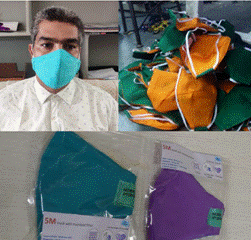Anti-microbial multilayer face mask to annihilate pathogenic microorganisms
New Delhi: As of now there is no vaccine or drug available to combat novel coronavirus. Mask, physical distancing and frequent handwashing are the only ways that can save lives. The World Health Organisation (WHO) has also given recommendations on the kind of mask that is most suitable for protection against coronavirus. But wearing mask for a long time may cause suffocation and proper handling of mask is tricky too. To address a few of such issues, Dr Marshal and his team at the School of Biomedical Engineering, Indian Institute of Technology (IIT-BHU), have developed an anti-microbial five-layered face mask.
This face mask can annihilate pathogenic microorganisms that are stuck to its outer surface and thereby limit the spread of secondary infections. “The mask that is available in the market currently acts as a filter to stop the entry of microbes to oral and nasal airways but does not have any effect on the microbe stuck to the mask surface,” said Dr Marshal, Associate Professor, School of Biomedical Engineering, IIT (BHU), while speaking with India Science Wire.
This shortcoming in masks could be dangerous for medical and paramedical staff due to the presence of higher viral or bacterial load on their outer surface. Dr Marshal’s team addresses this problem by stacking different layers of nanometal conjugated with protonated amine matrix.
The first layer of the mask can degrade any type of RNA, the next layer is anti-microbial, the third one is for air filtration, and the fourth and fifth layers are ‘comfortable layers’, which will remain close to the nose and mouth. “Copper and silver are de-transition elements and as per our knowledge they can degrade this virus and all the other members of SARS virus. We took a cocktail combination of copper, copper oxides, silver, and activated charged silver, which can help degrade RNA,” said Dr Marshal.
For degradation testing, the researchers took the RNA of lung cells as novel coronavirus propagates rapidly in the lungs. The RNA of other cells were also extracted. “We have extracted both cancerous and non-cancerous cells too. We have checked the degradation of these molecules. We have tested this in solution base and in coating base methods. This testing showed that the RNA was getting degraded. After this, we have optimised it,” said the researcher. The mask has hydrophobic surface on the outer layer to deflect water droplets containing the viruses. Patent has been applied for the product.

